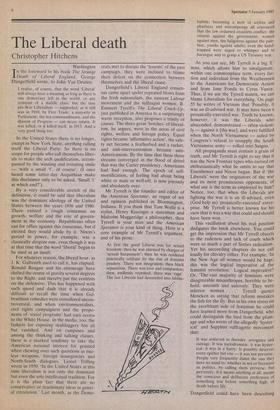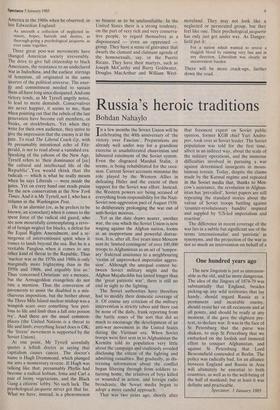The Liberal death
Christopher Hitchens
Washington
In the foreword to his book The Strange Death of Liberal England, George Dangerfield wrote, to John Van Druten: 1 realise, of course, that the word 'Liberal' will always have a meaning so long as there is one democracy left in the world, or any remnant of a middle class: but the true pre-War Liberalism — supported, as it still was in 1910, by Free Trade, a majority in Parliament, the ten commandments, and the illusion of Progress — can never return. It was killed, or it killed itself, in 1913. And a very good thing too.
In the United States there is no longer, except in New York State, anything calling itself the Liberal Party. So there is no scope for people who call themselves liber- als to make the arch qualification, accom- panied by the winning and irritating smile — 'with a small 'I', of course'. (I once heard some latter-day Asquithian make this disclaimer only to be asked, 'Small 'I' at which end?')
By a very considerable stretch of the definition, it could be said that liberalism was the dominant ideology of the United States between the years 1936 and 1980. There existed a rough consensus on growth, welfare and the role of govern- ment in the economy. Republicans often ran for office against this consensus, but if elected they would abide by it. Nixon's period in power, for example, was a classically dirigiste one, even though it was at that time that the word 'liberal' began to be used as an insult.
For whatever reason, the liberal hour, as J. K. Galbraith used to call it, has elapsed. Ronald Reagan and his entourage have shifted the centre of gravity several degrees to the Right, and thereby put the centrists on the defensive. This has happened with such speed and dash that it is already difficult to recall the time when Gal- braithian remedies were considered uncon- troversial, and when environmentalists, civil rights campaigners and the propo- nents of 'social programs' had easy access to the White House. In the media, too, the lashion for exposing skulduggery has all but vanished. And on campuses and among the thinking and talking classes, there is a marked tendency to take the American national interest for granted when chewing over such questions as nuc- lear weapons, foreign insurgencies and North-South dialogues. Lionel Trilling wrote in 1950. 'In the United States at this time liberalism is not only the dominant but even the sole intellectual tradition. For it is the plain fact that there are no conservative or reactionary ideas in gener- al circulation.' Last month, as the Demo- crats met to discuss the 'lessons' of the past campaign, they were inclined to blame their defeat on the connection between themselves and the liberal cause.
Dangerfield's Liberal England consen- sus came apart under repeated blows from the Irish nationalists, the nascent Labour movement and the suffragist women. R. Emmett Tyrell's The Liberal Crack-Up, just published in America to a surprisingly warm reception, also proposes a trinity of causes. The three great 'botches' of liberal- ism, he argues, were in the areas of civil rights, welfare and foreign policy. Equal rights became 'affirmative action', the safe- ty net became a featherbed and a racket, and anti-interventionism became anti- Americanism. By the time that these three streams converged in the flood of drivel that was the Carter presidency, Americans had had enough. The epoch of self- mortification, of feeling bad about being white or male or well-off, is now joyously and absolutely over.
Mr Tyrrell is the founder and editor of the American Spectator, an organ of wit and opinion published in Bloomington, Indiana. If you think that Tom Wolfe is a stylist, Henry Kissinger a statesman and Malcolm Muggeridge a philosopher, then Tyrrell is your man and the American Spectator is your kind of thing. Here is a core example of Mr Tyrrell's argument, and of his prose: At first the good Liberal was for sexual freedom; then he was alarmed by charges of 'sexual harassment'; then he was rendered practically celibate by the rise of feminist prudery. There was integration, then black separatism. There was love and compassion; then, endlessly repeated, there was 'rage'. The last Liberals had descended into bibble-
babble, becoming a mob of scribes and pharisees and nincompoops all convinced that the law ordained ceaseless conflict: the citizens against the government, women against men, the fuliginous against the pale- face, youths against adults'; even the hand- icapped were urged to whimper and to harangue and to grasp a US Treasury teat.
As you can see, Mr Tyrrell is a big `L' man, which allows him to amalgamate, within one commonplace term, every fac- tion and individual from the Weathermen to the Americans for Democratic Action and from Jane Fonda to Cyrus Vance. Thus, if we use the Tyrrell matrix, we can blame Liberalism for everything. On page 55 he writes of Vietnam that 'Possibly, it was an ill-advised war. It may have been a prosaically-executed war. Truth be known, however, it was the Liberals who absconded, demonstrated — often violent- ly — against it [the war], and were fulfilled when the North Vietnamese — aided by Congress's refusal to resupply the South Vietnamese army — rolled into Saigon.' All propaganda must contain a grain of truth, and Mr Tyrrell is right to say that it was the New Frontier types who carried on enthusiastically what he omits to say that Eisenhower and Nixon began. But if 'the Liberals' were the originators of the war and its most promiscuous opponents, of what use is the term as employed by him? Notice, too, that when the Liberals are fighting the war it is an ill-advised, even (God help us) 'prosaically-executed' enter- prise. Mr Tyrrell is better known for his view that it was a war that could and should have been won.
This vacillation about his real position disfigures the book elsewhere. You could get the impression that Mr Tyrrell objects to the rudeness and lack of couth which were so much a part of Sixties radicalism. Yet his succeeding chapters do not call loudly for chivalry either. For example, 'In the New Age all women would be hags; this was the logical imperative of the feminist revolution.' Logical imperative? Or, 'The vast majority of feminists were disagreeable misanthropes, horrible to be- hold, uncouth and unlovely. They were inferior women . . . .' Tyrrell quotes Mencken as saying that reform mistakes the fish for the fly. But in his own stress on the exorbitant side of feminism he could have learned more from Dangerfield, who could distinguish the bird from the plum- age and who wrote of the allegedly 'hyster- ical' and Sapphist suffragette movement that:
It was achieved in disorder, arrogance and outrage. It was melodramatic, it was hyster- ical, it was in a hurry. It possibly deserves every epithet but one — it was not perverse. People very frequently damn the sins they have no mind to. whether in sex or literature or politics, by calling them perverse; but perversity, if it means anything at all, means the conscious and deliberate preference of something low before something high, of death before life.
Dangerfield could have been describing America in the 1960s when he observed, in late Edwardian England:
As uncouth a collection of neglected in- stincts, hopes, hatreds and desires, as thorough-going a psychological jacquerie, as ever came together.
Three great post-war movements have changed American society irreversibly. The drive to give full citizenship to black Americans, the resistance to an undeclared war in Indochina, and the earliest stirrings of feminism, all originated in the same quarter of the political universe. The ener- gy and commitment needed to sustain them all have long since dissipated. And one victory tends, as Mr Tyrrell angrily notes, to lead to more demands. Conservatives are never happier, it seems to me, than when pointing out that the rebels of the last generation have become cult members, or freaks, or stockbrokers. Yet when they write for their own audience, they strive to give the impression that the enemy is at the gate. To read The Liberal Crack-Up, with its presumably intentional echo of Fitz- gerald, is not to read about a vanished era. Speaking of the yahoos of the New Age, Tyrrell refers to 'their dominance of [sic] the cultural and intellectual life of the Republic'.You would think that the radicals — which is what he really means when he says Liberals — were inside the gates. Yet on every hand one reads praise for the new conservatism at the New York Times. And it is Mr Tyrrell, not I, who has a column in the Washington Post.
He is an alarmist (or, as he prefers to be known, an iconoclast) when it comes to the spent force of the radical old guard, who are now mournfully contemplating a reviv- al of benign neglect for blacks, a defeat for the Equal Rights Amendment, and a re- surgence of interventionist spirit when it comes to lands beyond the sea. But he is a veritable Pangloss when it comes to any other kind of threat to the Republic. Thus 'nuclear war in the 1970s and 1980s is only marginally more frightening than in the 1950s and 1960s, and arguably less so.' Thus 'concerned Christians' are a menace, but the Armageddon evangelists do not rate a mention. Thus the conversion of pavements to assist the disabled is a mis- chievous imposition, but the bother about, the Three Mile Island nuclear mishap was a wimpish scare over something 'less peri- lous to life and limb than a fall into poison ivy'. And there are the usual common- places (the United Nations is a threat to life and limb; everything Israel does is OK; the 'freeze' movement is supported by the Soviet Union).
At one point, Mr Tyrrell scornfully quotes a leftish doctor as saying that capitalism causes cancer. The doctor's name is Hugh Drummond, which plunged me into a momentary reverie. If Hugh was talking like that, presumably Phyllis had become a radical lesbian, Irma and Carl a pair of loony vegetarians, and the Black
Gang a citizens' lobby. No such luck. The psychological jacquerie never got that far. What we have, instead, is a phenomenon
so bizarre as to be unclassifiable. In the United States there is a strong tendency, on the part of very rich and very conserva- tive people, to regard themselves as a dispossessed — even an oppressed — group. They have a sense of grievance that dwarfs the clamant and claimant agenda of the homosexuals, say, or the Puerto Ricans. They have their martyrs, such as Joseph McCarthy and Barry Goldwater, Douglas MacArthur and William West-
moreland. They may not look like a neglected or persecuted group, but they feel like one. Their psychological jacquerie has only just got under way. As Danger- field put it:
For a nation which wanted to revive a sluggish blood by running very fast and in any direction, Liberalism was clearly an inconvenient burden.
There will be more crack-ups, farther down the road.







































 Previous page
Previous page